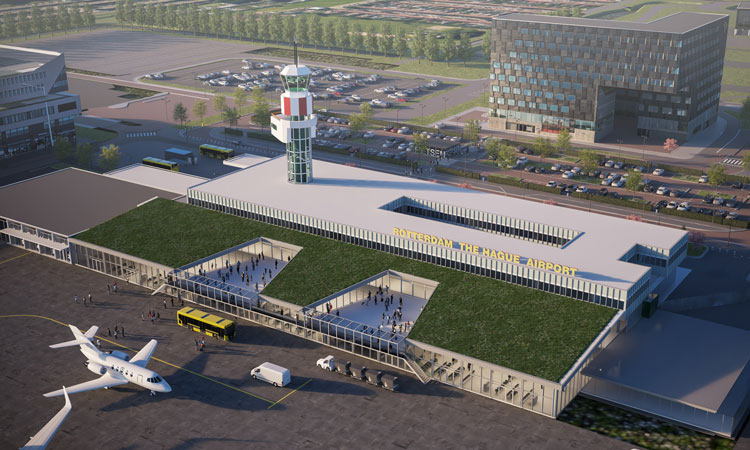Culture is a key element within an airport’s digital transformation
- Like
- Digg
- Del
- Tumblr
- VKontakte
- Buffer
- Love This
- Odnoklassniki
- Meneame
- Blogger
- Amazon
- Yahoo Mail
- Gmail
- AOL
- Newsvine
- HackerNews
- Evernote
- MySpace
- Mail.ru
- Viadeo
- Line
- Comments
- Yummly
- SMS
- Viber
- Telegram
- Subscribe
- Skype
- Facebook Messenger
- Kakao
- LiveJournal
- Yammer
- Edgar
- Fintel
- Mix
- Instapaper
- Copy Link
Posted: 2 March 2020 | Arash Rahmani - Rotterdam The Hague Airport | No comments yet
Arash Rahmani, Digital Strategist and IT Manager at Rotterdam The Hague Airport, details how digital transformation is not IT, and not a technical development, but a cultural change.


Managing an airport was simpler in the past. Overall, an airport in 2020 is not that much different from one in 1970, however when looking specifically at the behind-the-scenes operations, things have definitely changed.
Airport operations have changed significantly and this will most definitely continue in the coming years. Innovation is fuelling that change and airports are transforming into digital smart locations. Providing passengers with a more seamless experience while improving the levels of safety and security in a more data-driven environment, airports are implementing procedures such as self check in and baggage drop, 3D security scans, paperless border control and autonomous vehicles.
Decision makers within our industry are experiencing a more rapid change, especially those who have been working within the industry for decades. The speed of change is only going to increase as airports become smarter, data-driven and autonomous. To be able to adapt with these changes and efficiently use them, airport decision makers need to focus on people, processes, technology and – most importantly – culture.
While a solid digital strategy is an important element for a digital transformation, the right culture is needed to be able to execute the strategy. Research by McKinsey, Capgemini, Bain and others have shown that a lack of strong culture is the main hindrance to success. However, C-level executives and senior managers often think that technology is the most important element, resulting in companies investing heavily in technology with the belief that the right tool will fix all problems, without investing in people, processes and culture. What often occurs is technology is then pushed to employees who are not open to adapting; resulting in heavy delays and an inefficient use of resources. This frequently creates a mindset that avoids risk based on unsuccessful attempts in the past and is less flexible to adapting to change.
Arash Rahmani will be attending Airport IT & Security 2020 in Munich, joining over 400 experts in IT and security, to further discuss the digital transformation of airports. Partnered with Munich Airport, this conference will provide face-to-face networking, industry case studies, workshops and panel discussions.
Aviation must break down the industry’s silos
One of the main barriers to a successful digital transformation are silos. Silos are more than a structural issue; they create a culture with narrow-minded employees who hesitate to share information or collaborate across functions and departments. They create an environment with less transparency, where there are less organisation-wide initiatives and where employees are focused on tasks within their own department, rather than improving the processes organisation wide.
We work within an industry where breaking down silos is necessary. Our core processes go beyond silos: The process of passenger handling involves multiple departments such as safety and security, facilities, communications, marketing and IT. For innovation to succeed efficiently and effectively, silos need to be broken down so that the focus is on the core processes and how innovations can improve each step.
Understand the digital transformation process
In November 2018, Rotterdam The Hague Airport was the first airport in the world to use autonomous vehicles to improve the baggage handling process. This replaced the need for fixed conveyors and sorting systems as individual autonomous vehicles carried single luggage items along the most optimal route, with real-time tracking.
While this was ground breaking in the aviation industry, similar innovations have been around for years. Amazon and Alibaba warehouses have been using hundreds of autonomous vehicles to carry, route and track individual orders.
I believe that in our industry, the focus is not necessarily to become a disruptor, as regulation does not allow us to be fully disruptive. It is important to become a fast follower of innovations that improve the journey within an airport’s core processes: Processes such as passenger handling, luggage handling, ground handling and so on. All these operations need to be systematised into process schemes and with every step of the process we need to focus on what innovations are available to be used to the improve the journey. To be able to do that, a strong culture is needed to allow the environment to innovate, to experiment, to fail, and to learn from those failures. It needs leadership with a strong vision that can make decisions whilst understanding the full process and the impact those decisions make on the process chain. It needs employees to understand that what they are doing affects the process and is part of a bigger picture and goal.
Digital transformation tips
- Break down the silos
- Have a clear digital vision with the leadership team involved and communicate it to all employees and partners
- Be customer centric
- Define what innovation means to your organisation
- Give people decision-making power not based on seniority, but based on strengths
- Set up a journey for a cultural change and engage employees in that change
- Empower employees to drive a digital culture and make sure they have the time, space and resources to grow and improve their skills
- Have additional KPI’s that focus on behaviour
- Start by mapping process schemes and with every step of the process make sure management and other employees understand the change.
Airport IT & Security 2020 will host attendees from over 100 unique airports – make sure you register to join them, and Arash Rahmani, to hear of best practices in the IT and security sectors.
Biography
Arash Rahmani is a digital strategist with over 10 years of experience in translating and implementing organisation goals into an effective digital strategy, leading teams and helping companies improve their short- and long-term commercial performance, efficiently and effectively.
Since May 2017, Rahmani has been working at the Royal Schiphol Group. He began as the Marketing Manager and now is the IT Manager of Rotterdam The Hague Airport. Rahmani is also member on the CIO-Board of the Royal Schiphol Group.
Related topics
Digital transformation, Information technology (IT), New technologies


















